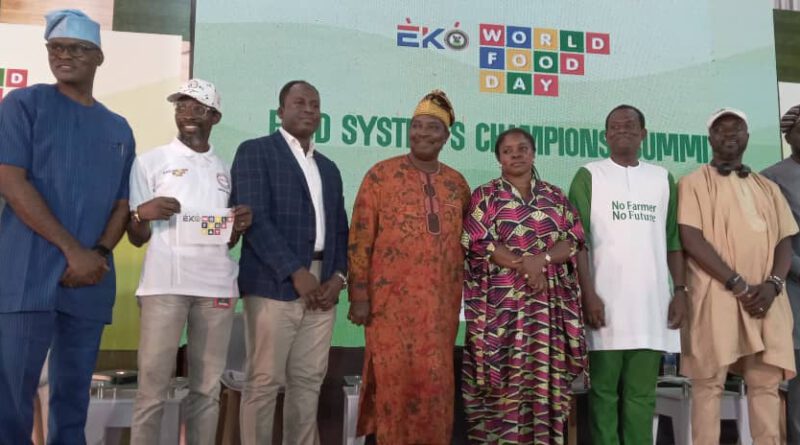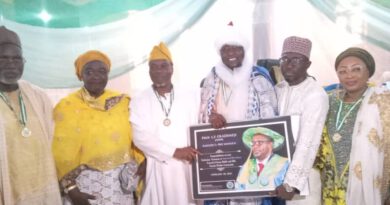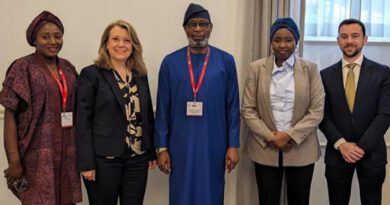Lagos Commissioner Commends Farmers as Stakeholders in Agric Ecosystem Demand Transparent Register to Maximize Sector’s Full Potential
Major stakeholders in the agricultural ecosystem in Lagos State have called for a transparent and detailed register of all categories of farmers across the state as part of efforts to maximize the sector’s full potential.
They believe that the availability of such a register will ensure that farm inputs and other government logistics reach the right people—those who are practicing farmers.
The stakeholders, including fish, poultry, and vegetable farmers, as well as those offering logistics support, made this call at the Food Systems Champions Summit held at Market Food Hub, Idi-Oro in Mushin.
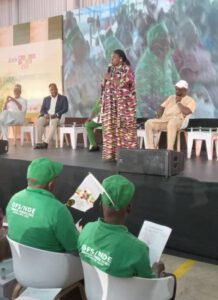
They also expressed difficulties in obtaining seedlings due to rising costs and in accessing ready markets to sell their produce.
During the interactive session, African Farmer Mogaji emphasized that Lagos deserves recognition as the food basket of the nation, adding that farmers suffer when their produce is delayed or cannot reach the city on time.
Mogaji also noted that any challenge in the distribution of food in Lagos has a ripple effect on the entire nation, underscoring the importance of food security.
Yinusa Alaba, Technical Director of Amo Farms, urged the government to provide single-digit loans to farmers through specialized banks, highlighting the alarming rise in the cost of poultry feed.

He further called on the government to ensure that moving forward, empowerment support is given only to identified and practicing farmers to prevent diversion of resources.
Dr. Adewale Adewoyin of Animal Care identified the generational gap as a major concern, noting that it is difficult to replace ageing farmers with younger ones.
He explained that many young Nigerians are either seeking greener pastures abroad or searching for white-collar jobs that are not available.
Another panelist, Sejiro Michael, called for a rapid response to the challenges in the sector to maximize the state’s water resources.

Sejiro, who is the Chairman of Fish Farmers in the state, pointed out that Lagos possesses fishing deposits that many countries do not have.
He expressed concern that out of 500 species of fish available, residents of the state largely rely on catfish and tilapia.
According to him, Lagos needs to harness its aquatic resources to provide residents with access to high-protein options and export the excess.
The Chairman of Mile 12 Market, Alhaji Usman Jubril, revealed that it is the largest perishable market in West Africa, adding that traders from Togo, Benin, Cameroon, and Chad bring their produce to the market for sale.
On what is required to bring down the prices of food items outside Mile 12 Market, Alhaji Usman noted that transportation, other logistics, and illegal checkpoints cause some sellers to unexpectedly increase prices.
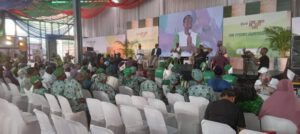
He also mentioned that insecurity in the country has prevented farmers from accessing their farmlands, but called for more young farmers across the country to reduce hunger and poverty.
Alhaji Usman Jubril urged agricultural students to engage more in practicals to ensure a seamless entry into the sector.
In response, the State Commissioner for Agriculture and Food Systems, Ms. Abisola Olusanya, expressed delight with the work done by the panelists, adding that the government will not take for granted the recommendations made during the session.
She stated that the session marked a departure from the past, which focused more on challenges while neglecting government interventions in the sector.
According to her, “In every challenging situation, there is room for new opportunities, and we must appreciate the good things that have been done by the government.”
The Special Adviser to the Governor on Agriculture, Dr. Oluwarotimi Fashola, and the Permanent Secretary in the Ministry, Mr. Emmanuel Audu, shared the view that starting a sustainable business in agriculture does not require much capital but rather commitment and passion.

